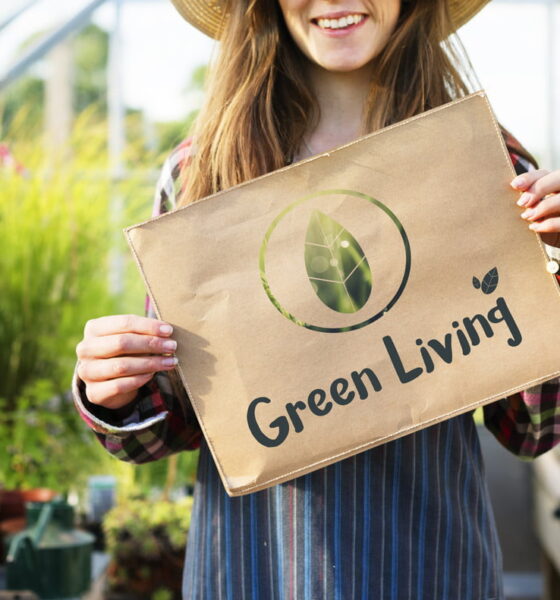

Lifestyle
Four Mindful And Sustainable Habits To Improve Home Health
Are you trying to stay sane during the COVID-19 quarantine, but also want to avoid leaving a larger carbon footprint? This can be a tricky balance. Many of the hobbies that people are taking up aren’t great for the environment.
Fortunately, there is an option worth looking into if you are trying to follow a sustainable lifestyle. You may want to start practicing mindfulness.
Mindfulness is a Great Sustainable Way to Spend Your Time
We are almost all in our homes far more than we are used to be. We are also at home longer than many of us expected. Instead of a respite from the world, our homes have become centers for all activities – work, school, exercise, even volunteering or fundraising. This close sharing of space can introduce stress at the time when maintaining your family’s health becomes much more important. Keeping your home life at its best in order for you to be at your own healthy best can be done by you setting a few habits using mindfulness. You also need to try to lower your environmental footprint as much as possible. This means that you should avoid taking unnecessary car rides or binge-watching Netflix, since these hobbies aren’t great for the environment.
The healthy method of mindfulness is a great way to approach this. Mindfulness at its most fundamental means focusing your awareness on the present, while allowing you to calmly acknowledge other aspects (such as thoughts and feelings). We certainly are focused on the present – hard to make any concrete plans for the future now – and our homes are a large part of this. Making a commitment to new habits will enhance your home’s ability to support your own health. Here are four new habits to consider.
Set Up Zones to Separate Moods and Activities
You do not want a stressful work conversation to spill over into your children’s school time or your partner’s meditation time. Likewise, your children’s play time might not be the best mood for your important office work. These areas do not have to be permanent – tidying away office tools each evening can return a workspace to a family dining place, and yoga mats can roll up for kids’ film or play time.
What if you do have a lot of stress occur in your home? If you must have a particularly tough conversation, for example about a work matter, try to ‘clear the air’ by doing just that. Clear the air by opening a window or lighting a candle, have a tidy, do a little exercise, let in more light. This is good for the environment as well, since you will create a more holistic living environment naturally, rather than using an air conditioner or air purifier that leaves a carbon footprint. Change the place association with something that changes your mindset.
Connect to Nature
Spending time in nature is the most environmentally friendly hobby available. Nature is always a good source to support our health and can be a wise teacher especially at this time. Wouldn’t it be great to try forest bathing now that you have the time? But not all of us have a forest nearby, especially with enough space to allow easy social distancing if we all rushed there!
Getting your fingers into earth is often a good idea, but not all of us have gardens or allotments. While you may not be able to grow a garden in your space, you can bring Nature into your home through plants and flowers. Most of us get a lift when fresh flowers brighten a room, but it is more than that. Studies have shown that flowers can improve your memory and make you more productive, and flowers can enhance relaxation and sleep.
Flowers with certain colors can affect your mood. You may want to add different colored flowers in each of the zones in your home. You can use red, orange, and yellow for exercise and work zones, and keep some green for that creative work you need to finish. Blues and of course lavender are relaxing and can enhance sleep. Keep them fresh, and consider treating yourself with the money you’re saving by not going out socially to get some professionally chosen and arranged flowers delivered.
Keep One Room Clean and Restful
This may be the kitchen, dining space, or a lounging area, but it should be a space that all can come to as a safe and calm base and a place to feel grounded. This may also be a respite from their own activities, or their own room – especially important for untidy kids’ rooms or a stressful office substitute.
In the spirit of sharing space, there might be bonus points for having everyone in the household pitch in to keep it at its optimal best. The joint commitment of contributing to the shared place is a way for each to strengthen their relationship with each other and also the home.
Commit to a Set Time Each Day to Have Your Home Tidy
This habit marks time as well as honoring the space. Whether you start ahead of the hour and give attention throughout the day or do all the tidying just in time for the commitment, it serves as a reset and a time to start afresh. Some people do their best cleaning in the morning and love to have a clean space to start a new day; others like to use this as a marker to separate the day, with its busyness, study, and employment activities, from the more refreshing and nurturing activities of the evening, a time to relax and restore your health.
Mindfulness Habits Are A Good Foundation for Sustainable Living
Sustainable living can be a challenge during quarantine. However, you can live an eco-friendly lifestyle through mindfulness. Learning new ways to enjoy our homes and seeing how these can support our health may inspire many of us to keep these new habits once we have gone out into the new normal – whatever and whenever that may be.
































